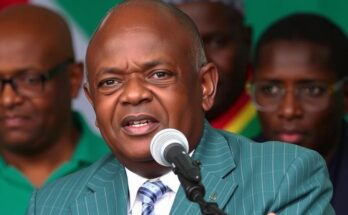Mauritius will hold elections on Sunday amidst a wire-tapping scandal that threatens civil liberties, challenging Prime Minister Pravind Jugnauth’s re-election bid. The election follows the historic transfer of the Chagos Islands from Britain and highlights concerns regarding rising corruption and diminishing democratic integrity in the nation, traditionally seen as a stable democracy.
Mauritius is set to vote on Sunday amid a significant wire-tapping scandal that has raised concerns regarding the erosion of civil liberties in the island nation, which has traditionally been regarded as a model of stability in Africa. As the country observes the recent transfer of sovereignty over the Chagos Islands from Britain, Prime Minister Pravind Jugnauth’s anticipated easy path to re-election has been disrupted by the emergence of secretly recorded conversations implicating various public figures in misconduct. In response to the scandal, the government attempted to ban social media, but this action was quickly rescinded due to public outrage. With a voter registration exceeding one million, the election marks the twelfth legislative poll since Mauritius achieved independence in 1968. However, observers fear a decline in democratic integrity, attributed to escalating corruption and the apparent inadequacy of oversight institutions. Democracy researcher Roukaya Kasenally noted that significant governance challenges have surfaced, including procurement scandals linked to COVID-19 and the oppression of dissenting voices. This sentiment is mirrored in the recent decline of Mauritius in the Ibrahim Index of African governance, indicating worsening social discrimination, especially regarding the Creole community. The political landscape remains dominated by a few families since independence, with Jugnauth seeking to retain control against resurgent opposition from both established and emerging parties, notably the Linion Reform alliance advocating for transparency and accountability. While the government celebrates the successful negotiation over the Chagos Islands, the implications of future U.S. military presence in the region could complicate the political landscape. The outcome of the election may serve as a crucial juncture in determining whether Mauritius can reclaim its reputation as a stable democracy or succumb to the issues plaguing its governance.
The article discusses the current political climate in Mauritius ahead of a key legislative election, framing the event within the context of a wire-tapping scandal that has shaken public trust and raised concerns about civil liberties. It reflects on Mauritius’s historical status as a stable and prosperous democracy, highlighting significant recent events such as the relinquishment of British control over the Chagos Islands. The commentary from political experts underscores the growing tensions and potential erosion of democratic values as voters head to the polls.
In summary, the upcoming elections in Mauritius occur under a cloud of controversy surrounding wire-tapping allegations, which have stirred public dissent and highlighted pressing issues of governance and equality. As the nation grapples with these challenges, the implications of the election results could either affirm or undermine Mauritius’s reputation as a beacon of democratic success in Africa.
Original Source: www.seychellesnewsagency.com




